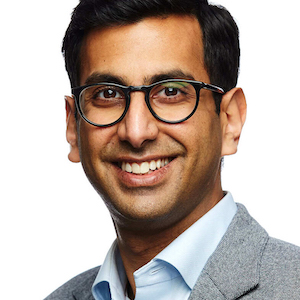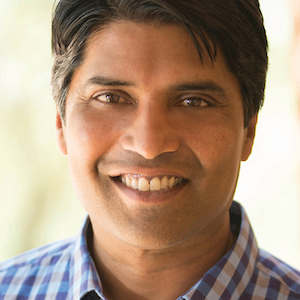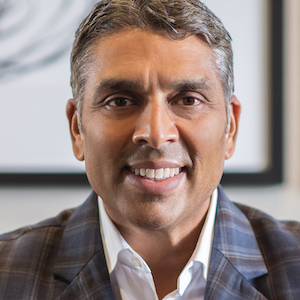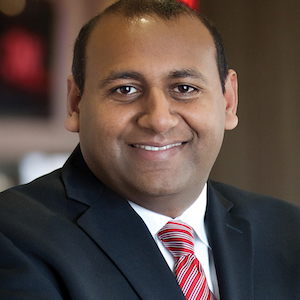
Based on reader nominations, LODGING recognizes dynamic executives who have helped to make 2022 a year of progress in the hotel industry across four key areas. We commend and congratulate Ali Moloo, CEO of myDigitalOffice; Mit Shah, CEO of Noble Investment Group; Naveen P. Kakarla, president and CEO of HHM; and Mehul Patel, managing partner, CEO of NewcrestImage. Each has led his company to remarkable achievements in technology, management, development, and finance, respectively.
Technology | Ali Moloo: MyDigitalOffice cofounder envisioned data platform to ease hoteliers’ pain Points
 The business that myDigitalOffice (MDO) CEO Ali Moloo grew up in was not hospitality, yet he helped launch a property management company while he was still attending college in Canada. Subsequently, he leveraged his experience in his family’s office supplies business into a position as CEO of one of the fastest-growing office-product companies in Canada. Then, in 2015, he cofounded MDO to help hospitality executives make data-driven decisions to improve the guest experience and operate more efficiently.
The business that myDigitalOffice (MDO) CEO Ali Moloo grew up in was not hospitality, yet he helped launch a property management company while he was still attending college in Canada. Subsequently, he leveraged his experience in his family’s office supplies business into a position as CEO of one of the fastest-growing office-product companies in Canada. Then, in 2015, he cofounded MDO to help hospitality executives make data-driven decisions to improve the guest experience and operate more efficiently.
Although he personally didn’t man the front desk or clean guestrooms in a family-run hotel, Moloo learned about the challenges faced by hoteliers from family members who had directly experienced common hospitality pain points. He also learned a lot about running a successful company from being part of his family’s business and witnessing his father’s ability to identify future headwinds for the office-supplies industry. “We focused on people, process, and product,” he says, noting that through digital adoption they managed to both disrupt their own business and leave a smaller environmental footprint.
With an awareness of the challenges facing hoteliers and expertise in data management, Moloo cofounded and launched MDO to ease some of those pain points by providing customers with centralized, digital access to all their hotel’s most critical documents and cross-functional performance metrics.
Major Growth in 2022
Since launching MDO, he has seen the company through tremendous growth. MDO earned a spot on the 2022 Inc 5000 list, ranking No. 668 among the fastest-growing private companies in the United States and No. 6 in the travel and hospitality space. He has also seen its staff size balloon from fewer than 100 team members to more than 300 in 2022. “I’m proud of the culture we are building from leadership down,” he says, adding that “evolving remote work trends have allowed us to acquire top talent throughout the globe.”
Moloo says the first half of 2022 was marked by acquisitions, including Focal Revenue, a hospitality revenue intelligence tool, and Datavision, an industry leader in hotel data analytics and business intelligence. The second half of the year has been devoted mainly to process, which he describes as “integrating these products and creating the framework for a unified data platform to empower our rapidly growing user base with the information they need to run successful hotels.”
Reflecting on 2022 overall, Moloo’s says, “Thanks to our incredible hotel partners and team members, we’ve laid the foundation for our mission to become part of the back-office technology stack in every hotel across the world.”
Helping Aspiring Entrepreneurs
Moloo adds that he and his company have not been focused solely on their own success. He says he enjoys mentoring aspiring entrepreneurs through the Entrepreneurs’ Organization Accelerator program. Moloo also recalls how, during the pandemic, when the weaknesses of the manual processes traditionally used to manage hotel operations and information were made painfully apparent, the company built and offered short-staffed hoteliers a free tool to help them better forecast demand in their respective markets.
Management | Naveen P. Kakarla: HHM leader and his team have driven remarkable growth and stability in the company’s portfolio
 Naveen Kakarla is the president and CEO of HHM (formerly known as Hersha Hospitality Management) and serves on its board of directors. HHM manages 235 hotels with a concentration in nearly all major markets across 32 states and three Canadian provinces. Kakarla is responsible for HHM’s investment and fund management, acquisitions and development, finance and accounting, human resources, and capital projects.
Naveen Kakarla is the president and CEO of HHM (formerly known as Hersha Hospitality Management) and serves on its board of directors. HHM manages 235 hotels with a concentration in nearly all major markets across 32 states and three Canadian provinces. Kakarla is responsible for HHM’s investment and fund management, acquisitions and development, finance and accounting, human resources, and capital projects.
Among many notable achievements, Kakarla launched HHM’s luxury and lifestyle division, which features the Independent Collection of uniquely curated hotels and resorts in gateway markets from coast to coast. Today, HHM manages nearly 75 independent, luxury, and lifestyle hotels. In the past, Kakarla led the New York City region for HHM and oversaw its development and construction division.
Outside the real estate sector, Kakarla was previously a partner specializing in corporate and securities law at the national law firm of Jenkens & Gilchrist, P.C., and was formerly associated with Akin, Gump, Strauss, Hauer Feld, LLP in Washington, D.C. He earned a Bachelor of Arts from Austin College and a law degree from Cornell Law School. Prior to joining HHM in 2005, he worked with private equity and early-stage investments.
Kakarla is a board trustee at Thomas Jefferson University Hospital System, which includes the Sidney Kimmel Medical College. He also serves on the corporate board of the Barnes Foundation Museum and is an active member of the Young Presidents’ Organization.
2022 Hotel Management Wins
As president and CEO, Kakarla has been a catalyst for the near-doubling of HHM’s management portfolio since the COVID-19 pandemic. He states, “I am most proud this year of our ability and focus to drive outsized results for our owners, plus our emphasis on retention and growth of our hotels, associates, and ownership relationships.”
HHM has grown organically, with highly institutional owners, and kept its churn rate (hotels that leave its system for competitors) to less than 2 percent with an equally impressive relinking rate (hotels that stay with HHM despite being sold from one owner to another). “For example, in the past two years, we have added 132 hotels and lost just over a dozen hotels across our diverse portfolio,” Kakarla points out.
Also in 2022, HHM successfully integrated a sizable portfolio of 25 hotels (formerly managed by White Lodging) in a single day—Feb. 1. Subsequently, HHM integrated Urgo Hotels and Resorts into its portfolio on another single day—Aug. 1. That portfolio included nearly 55 hotels across the United States and Canada. “I am proud of how our teams have welcomed the Urgo family into our company culture (and vice versa) and expect us to build something together that neither of us could have done alone,” he comments.
The company is well balanced geographically (Texas, Florida, and California comprise its biggest state concentrations) and across a range of hotel types: independent, luxury, and lifestyle hotels, ranging from mountain leisure to urban transient to resorts to condo hotels.
Minimizing Staff Turnover
On the retention side, Kakarla and his team have also been successful. HHM has held onto nearly all its regional operations and sales leadership through the downturn and in 2022. “We are extremely proud to be a values-based and family-oriented culture that supports each other through good and bad times,” Kakarla says. “Our emphasis this year has been around rebuilding our learning and development and other support services for our managed hotels.”
Development | Mit Shah: Noble Investment Group CEO implements a two-pronged development strategy
 Mit Shah is CEO of Noble Investment Group, a real estate investment management firm specializing in select-service and extended-stay travel and hospitality with more than $5 billion in investments. He founded the company some 30 years ago, but his roots in hospitality go back to childhood, when, as the son of “entrepreneurial immigrants,” he built the work ethic and reputation that have brought him recognition and success. Shah, who presently serves as an executive committee member of the board of directors for the American Hotel & Lodging Association, has received many honors, the most recent of which is the Industry Real Estate Financing Advisory Council (IREFAC) Arne Sorenson Award for outstanding leadership in the hospitality industry. And in 2023, he will be named Hospitality Executive of the Year by the Penn State School of Hospitality Management and Alumni Society.
Mit Shah is CEO of Noble Investment Group, a real estate investment management firm specializing in select-service and extended-stay travel and hospitality with more than $5 billion in investments. He founded the company some 30 years ago, but his roots in hospitality go back to childhood, when, as the son of “entrepreneurial immigrants,” he built the work ethic and reputation that have brought him recognition and success. Shah, who presently serves as an executive committee member of the board of directors for the American Hotel & Lodging Association, has received many honors, the most recent of which is the Industry Real Estate Financing Advisory Council (IREFAC) Arne Sorenson Award for outstanding leadership in the hospitality industry. And in 2023, he will be named Hospitality Executive of the Year by the Penn State School of Hospitality Management and Alumni Society.
When asked to describe for LODGING the decisions that underlie his company’s overall investment strategy, he was clear: “Whatever makes money. As fiduciaries to state pension plans, university endowments, and foundations around the world, our job is to make decisions based on the best interests of our beneficiaries, such as teachers, law enforcement, and firefighters. So, if we make more money developing than acquiring, we develop, and if we make more money acquiring than developing, we acquire. At the end of the day, it’s all about determining the best way to achieve risk-adjusted returns.”
Routes to Success in Development
Noble Investment Group typically devotes about 20 percent of its $750 million to $1 billion in equity each year to new development. The development strategy encompasses two different approaches: “One part of our development strategy is taking underutilized real estate in high-profile locations—such as surface parking for office and retail—and creating hospitality components, i.e., first-class select-service and extended-stay hotels,” he explains. Examples include a Courtyard by Marriott and Element by Westin, built last year in midtown Atlanta, Georgia; and a Tempo by Hilton, a new lifestyle brand, that is currently being developed in the Historic District of Savannah, Georgia. The other aspect of Noble’s development strategy is building midscale extended-stay properties, which can be built to a double-digit unleveraged yield and operate at 50 percent-plus profit margins.
Describing new development as “a core part of our DNA for three decades now,” Shah reflects on his first development project, a Hampton Inn, in the early 1990s, when the segment was relatively new, and investment required development. “At that time, you could build a Hampton Inn for $40,000 a room at a RevPAR of $40, which meant you could generate enough cash flow in that first year to produce 20 percent equity returns, then refinance your equity out a short time later.” Using this “wash, rinse, repeat” approach, he says, “we built a development business from the inception of the company to take advantage of that market.”
Shah says the price tag is different today, but the returns remain attractive. “We can deliver a midscale extended-stay property for a little over $100,000 a key, which can yield $80-$90 of RevPAR.” The urban developments, he adds, cost three times that amount but yield a worthwhile proportional return. In sum, “We believe that—even in this environment—there is an opportunity for growth in both these high-end city locations and in midscale extended stay.”
Fiduciary Responsibility
Shah concludes by stressing the care that Noble Investment Group takes as a steward of the funds entrusted to them. “We’re always focused on achieving the kind of return we’re targeting, and, in our business, that is a product of the right market and the right real estate. Our beneficiaries trust us as their fiduciary, so our job is to make decisions based on their best interests.”
Finance | Mehul Patel: NewcrestImage CEO and his team achieve a record number of successful transactions
 Mehul Patel began developing his passion for the hotel industry at age 17, when he and his brother, Sanjay, bought their first property — a 46-room independent hotel near Love Field Airport in Dallas, Texas, where their parents worked. The brothers then continued the business of renovating, repositioning, and reselling a variety of limited-service properties across Texas. Along the way, Patel became attracted to the problem-solving aspect of the industry, and that disposition is one of the reasons for his success.
Mehul Patel began developing his passion for the hotel industry at age 17, when he and his brother, Sanjay, bought their first property — a 46-room independent hotel near Love Field Airport in Dallas, Texas, where their parents worked. The brothers then continued the business of renovating, repositioning, and reselling a variety of limited-service properties across Texas. Along the way, Patel became attracted to the problem-solving aspect of the industry, and that disposition is one of the reasons for his success.
Today, Patel serves as managing partner and CEO of Dallas-based NewcrestImage, which was launched as a family business in 2013 when three sets of brothers merged their two hospitality firms — Newcrest Management and Image Hospitality. Beyond his own company, Patel has served in many influential roles in the hospitality industry. In 2013-2014, he served as the youngest chairman in the history of the AAHOA, and he has been a member of the brand councils of AC Hotels for Marriott International, Hyatt Place and Hyatt House for Hyatt Hotels Corporation, and Hampton Inn & Suites for Hilton Worldwide. NewcrestImage currently owns and operates 30 hotels nationwide. Since its founding, the company has completed more than $3 billion in transactions involving more than 200 hotels and 25,000 hotel rooms in 122 communities across the country.
A Year of Unprecedented Activity
Originally involved in development, management, and investment, NewcrestImage has focused on investment since the pandemic, contracting with Aimbridge Hospitality for the management function. The company achieved great success with that exclusive focus, particularly this year. “2022 has been a remarkable year for us, with the largest number of transactions we’ve done in our history,” Patel says. “We can get a debt and equity at reasonable rate because our longstanding relationship with the lending community. And that has allowed us to move forward with so many transactions this year.” Among the highlights are the following:
- In January, NewcrestImage purchased nine hotels in Arizona from G6 Hospitality—six branded Motel 6 and three branded Studio 6.
- In July, the company entered a definitive agreement with a joint venture between Highgate and Cerberus to acquire four LaQuinta-branded properties, totaling 696 rooms. The properties include the LaQuinta Inn & Suites at Los Angeles International Airport, marking NewcrestImage’s first gateway location in California.
- In September, NewcrestImage reached a definitive agreement to purchase 45 hotels from a private investment firm. The portfolio totals approximately 3,300 rooms and includes 35 Marriott-branded, seven Hilton-branded, two Choice-branded, and one Radisson-branded property, located in 11 states. n Also in September, NewcrestImage and Hospitality Capital Partners announced the acquisition of 16 Marriott-branded hotels with a total of 2,155 rooms in nine states. Aimbridge will be managing the properties.
Patel notes that acquisitions often present an opportunity to make the hotels more successful. “Every time we buy [a hotel], we have to think outside the box and ask, how do we look at this investment opportunity and turn it around differently than the [previous owners did]? We’re not always looking to add value, but if somebody has a mismanagement at a property, for example, that’s where we deep dive in and fix it. It takes a laser focus to say, where is the problem? And that has been our secret sauce.”
Team Approach
Pinpointing buying and selling opportunities and ultimately closing deals is a team effort, Patel stresses. “We have a group of 10 people, including my partners and our chief investment officer team. So, every time we get a deal all of us look at it together—it’s all or none. It’s a group decision, and we all win as a team.” Although he is the CEO, Patel insists that in the end, “the project is the boss. That’s one of my management tips: the project dictates the terms, the time commitment, the money” and every aspect of the team’s operation.











